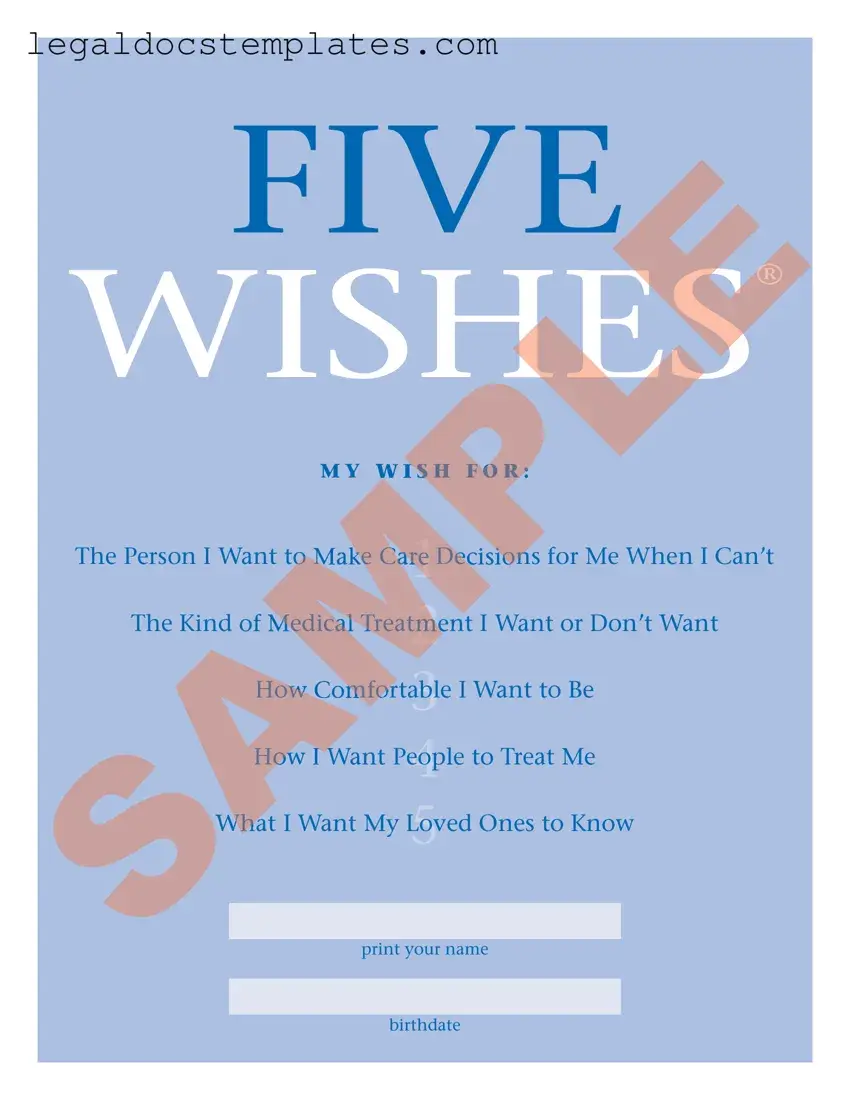The Five Wishes Document is similar to a Living Will, as both allow individuals to state their preferences for end-of-life care. A Living Will specifically covers a person's desires concerning medical treatments and interventions when they are terminally ill or in a persistent vegetative state and can no longer communicate their wishes. Like the Five Wishes, it helps guide family and healthcare providers in making decisions that align with the patient's values and preferences.
A Durable Power of Attorney for Health Care (DPOA-HC) is another document akin to the Five Wishes. This document allows an individual to appoint a Health Care Agent (or proxy) to make medical decisions on their behalf if they become unable to do so themselves. While the Five Wishes includes this aspect as its first wish, a standard DPOA-HC focuses exclusively on the delegation of decision-making authority without addressing the specifics of care preferences in various scenarios.
An Advance Healthcare Directive combines elements of both a Living Will and a DPOA-HC, making it similar to the Five Wishes. It enables individuals to outline their healthcare preferences, including life-sustaining treatments they would or would not want, and appoint a healthcare proxy. The Five Wishes Document takes this a step further by incorporating personal, emotional, and spiritual wishes alongside medical preferences.
Do Not Resuscitate (DNR) orders, while more specific and limited in scope, share the Five Wishes' goal of directing healthcare according to personal choices. A DNR order tells medical professionals not to perform CPR if a patient's heart stops or if they stop breathing. The Five Wishes allows for this type of directive within a broader document that covers more aspects of end-of-life care.
The POLST (Physician Orders for Life-Sustaining Treatment) form, designed for seriously ill or frail patients, details what kinds of medical treatment patients wish to receive towards the end of their lives. Like the Five Wishes, POLST is intended to ensure that patients receive only the types of care they want. However, POLST is a medical order that applies to specific treatments like intubation or feeding tubes, while Five Wishes offers a more comprehensive reflection of a person’s care preferences.
A Healthcare Proxy form specifically allows an individual to appoint another person to make healthcare decisions if they become incapacitated. This is similar to the first wish in the Five Wishes Document but does not include the additional aspects of personal, emotional, and spiritual needs. However, both documents ensure that someone trusted can advocate for the patient's wishes.
An Ethical Will, though not a legal document, shares the spirit of the Five Wishes by communicating values, life lessons, and hopes for the future to family and friends. While it doesn't deal directly with medical decisions, an Ethical Will complements the Five Wishes by providing a more rounded view of one’s personal and spiritual desires alongside healthcare preferences.
A Mental Health Advance Directive allows individuals to outline their preferences for treatment in case of a mental health crisis, including medications, hospitalization preferences, and even refusal of certain treatments. Similar to the treatment preferences outlined in the Five Wishes, it guides care in a way that respects the patient's values and autonomy but focuses specifically on mental health situations.
An Organ and Tissue Donation Registration form allows individuals to indicate their wish to donate organs and tissues upon death. This act, which can be integrated into the Five Wishes Document, focuses on the specific aspect of posthumous medical decisions, highlighting the individual's wishes regarding the use of their body after death to save or improve others' lives.
Lastly, a Funeral Planning Declaration enables individuals to articulate their preferences for their funeral arrangements, similar to how the Five Wishes allows people to express how they want their end-of-life care to be handled. This could include details about burial or cremation, the type of service desired, and other personal touches. While primarily concerning posthumous matters, it reflects the comprehensive planning seen in the Five Wishes Document.












